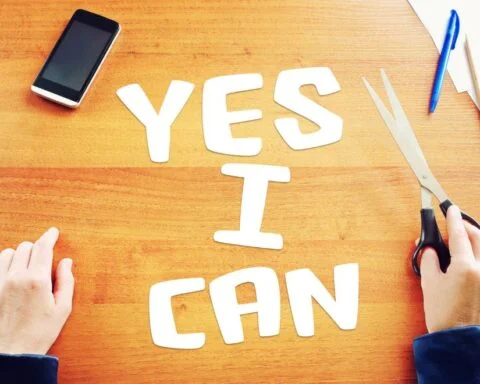Achieving our goals in life requires two key abilities: confidence and assertiveness. Assertiveness, or the capacity to stand up for oneself and our rights, is the opposite of confidence. Which is the belief in our own abilities and values. Speaking up for ourselves, taking chances, and achieving our goals are all more likely when we are self-assured and aggressive.
The significance of confidence and assertiveness will be discussed in this essay, along with some suggestions for improving them. Being confident and forceful is more crucial than ever in modern society. We must be able to speak out for ourselves and our opinions in the job, and we must be able to interact with coworkers efficiently. We must be able to set limits in our own life and refuse to do things we don’t want to.
Confidence and assertiveness are two qualities that can have a profound impact on our lives. When we are confident, we believe in ourselves and our abilities. We are more likely to take risks, try new things, and achieve our goals. When we are assertive, we are able to stand up for ourselves and our rights. We are more likely to get what we want and need, and we are less likely to be taken advantage of.
As we examine ways to overcome these issues, we’ll also look at some of the difficulties that can arise while trying to be aggressive and confident.
What is confidence and assertiveness?
Confidence and assertiveness are two closely related but distinct concepts.
- Confidence is the belief in one’s own abilities and worth. It is a feeling of self-assurance that allows us to take risks, try new things, and achieve our goals.
- Assertiveness is the ability to stand up for one’s rights and express one’s needs in a clear and direct way, without being aggressive or passive. It is about being able to communicate effectively and respectfully, even when we disagree with someone or are being challenged.
Confident people believe in themselves and their abilities. They are not afraid to take risks or try new things. They are also not afraid to fail, because they know that failure is a part of learning and growth.
Assertive people are able to stand up for themselves and their rights. They are not afraid to say no to things they don’t want to do, and they are not afraid to ask for what they want. They are also able to express their opinions and feelings in a clear and direct way, without being aggressive or passive.
Confidence and assertiveness are both important qualities that can help us succeed in life. When we are confident, we are more likely to take risks and try new things. When we are assertive, we are more likely to get what we want and need.
Here are some of the benefits of confidence and assertiveness:
- Increased self-esteem
- Improved communication skills
- Better decision-making
- Increased productivity
- Stronger relationships
- More opportunities
Here are some tips for boosting your confidence and assertiveness:
- Set realistic goals and achieve them.
- Take care of yourself physically and mentally.
- Surround yourself with positive people.
- Practice positive self-talk.
- Take risks and step outside your comfort zone.
- Use “I” statements.
- Make eye contact.
- Speak in a clear and confident voice.
- Don’t be afraid to say no.
- Practice saying no in different situations.
- Talk to a therapist or counselor.
- Join a support group.
If you are struggling with confidence or assertiveness, there are many resources available to help you. You can talk to a therapist or counselor, join a support group, or read self-help books. With time and effort, you can boost your confidence and assertiveness and achieve your goals.
The benefits of confidence building activities:
Here are some of the benefits of confidence building activities in detail:
- Increased self esteem: Confidence and assertiveness are rooted in self-esteem. When we believe in ourselves and our abilities, we are more likely to feel good about ourselves. This can lead to a number of other benefits, such as improved mental health, better relationships, and increased productivity.

- Improved communication skills: Confidence and assertiveness can help us communicate more effectively. When we are confident, we are less likely to be afraid of speaking up or expressing our opinions. We are also more likely to be able to listen to others and take their feedback into account.

- Better decision-making: Confidence and assertiveness can help us make better decisions. When we are confident, we are more likely to trust your gut instincts and take risks. We are also more likely to be able to weigh the pros and cons of different options and make a decision that is best for us.

- Increased productivity: Confidence and assertiveness can help us be more productive. When we are confident, we are more likely to take initiative and set goals for ourselves. We are also more likely to be able to persevere in the face of challenges.

- Stronger relationships: Confidence and assertiveness can help us build stronger relationships. When we are confident, we are more likely to be able to communicate our needs and boundaries to others. We are also more likely to be able to stand up for ourselves and our loved ones.

- More opportunities: Confidence and assertiveness can help us open up more opportunities for ourselves. When we are confident, we are more likely to take risks and try new things. We are also more likely to be able to network with others and build relationships that can lead to new opportunities.

In addition to these benefits, confidence and assertiveness can also help us to:
- Be more resilient in the face of challenges
- Deal with stress more effectively
- Enjoy life more
If you are looking to boost your confidence and assertiveness, there are a number of things you can do. Here are a few tips:
- Set realistic goals and achieve them. When you achieve a goal, it will help you to feel more confident in your abilities.
- Take care of yourself physically and mentally. Eating healthy, exercising, and getting enough sleep can all help to boost your confidence.
- Surround yourself with positive people. The people you spend time with can have a big impact on your self-esteem. Make sure to surround yourself with people who believe in you and support you.
- Practice positive self-talk. The way you talk to yourself has a big impact on your confidence. Make sure to focus on your strengths and accomplishments, and avoid negative self-talk.
- Take risks and step outside your comfort zone. This can be scary, but it is one of the best ways to build confidence. When you face your fears and take risks, you will learn that you are capable of more than you thought.
- Use “I” statements. When you are communicating with others, use “I” statements to express your needs and wants. This will help you to be more assertive and less likely to be taken advantage of.
- Make eye contact. When you are speaking to someone, make eye contact. This shows that you are confident and engaged in the conversation.
- Speak in a clear and confident voice. When you speak, do so in a clear and confident voice. This will help you to project an image of confidence.
- Don’t be afraid to say no. It is okay to say no to things you don’t want to do. When you are assertive, you are able to set boundaries and protect your time and energy.
- Practice saying no in different situations. The more you practice saying no, the easier it will become.
- Talk to a therapist or counselor. If you are struggling with confidence or assertiveness, talking to a therapist or counselor can be helpful. They can help you to identify the root of the problem and develop strategies for building confidence and assertiveness.
Confidence building activities take time and effort, but it is worth it. When you are confident and assertive, you are more likely to achieve your goals, have better relationships, and enjoy life more.
Challenges to confidence and assertiveness
- Negative self-talk: Negative self-talk is a common challenge to confidence and assertiveness. When we talk to ourselves negatively, it can be difficult to believe in ourselves and our abilities. We may tell ourselves things like “I’m not good enough” or “I’ll never be able to do that.” It’s important to challenge these negative thoughts and replace them with positive ones.

- Fear of rejection: Fear of rejection is another common challenge to confidence and assertiveness. We may be afraid of being judged or rejected by others if we speak up or express our opinions. This fear can hold us back from taking risks and putting ourselves out there. It’s important to remember that rejection is a part of life, and it doesn’t mean that we’re not good enough.

- Perfectionism: Perfectionism can also be a challenge for confidence building activities. We may be afraid of making mistakes or not being perfect, so we avoid taking risks or speaking up. It’s important to remember that perfection is not possible, and that making mistakes is a part of learning and growing.

- Past experiences: Past experiences can also impact our confidence and assertiveness. If we have been bullied or taken advantage of in the past, we may be less likely to stand up for ourselves or speak up. It’s important to work through these past experiences and challenge the beliefs that they have created.

- Low self-esteem: Low self-esteem is a fundamental challenge confidence building activities. When we have low self-esteem, we don’t believe in ourselves or our abilities. This can make it difficult to take risks, speak up, or set boundaries. It’s important to work on building our self-esteem by focusing on our strengths and accomplishments.

If you are struggling with any of these challenges, there are things you can do to overcome them. Here are a few tips:
- Challenge your negative thoughts: When you have a negative thought, ask yourself if it is really true. Are you being fair to yourself? Can you find any evidence to support the thought? If not, try to replace the negative thought with a more positive one.
- Face your fears: If you are afraid of rejection, try to face your fear by putting yourself in situations where you might be rejected. This could mean speaking up in a meeting or asking someone out on a date. The more you face your fears, the easier they will become to manage confidence building activities.
- Let go of perfectionism: Perfectionism is an unrealistic goal. There will always be things that we can improve on. Instead of striving for perfection, focus on doing your best and learning from your mistakes.
- Heal from past experiences: If you have been bullied or taken advantage of in the past, it’s important to work through these experiences and challenge the beliefs that they have created. This could involve talking to a therapist or counselor, or journaling about your experiences.
- Build your self-esteem: There are many things you can do to build your self-esteem. These include taking care of yourself physically and mentally, setting goals and achieving them, and surrounding yourself with positive people.
Building confidence and assertiveness takes time and effort, but it is worth it. When you are confident and assertive, you are more likely to achieve your goals, have better relationships, and enjoy life more.
How to overcome these challenges?
Here are some tips on how to overcome challenges in detail:-
Identify the challenge: The first step to overcoming a challenge is to identify it. What is the challenge that you are facing? What are the confidence building activities?
Break it down into smaller steps: Once you have identified the challenge, break it down into smaller, more manageable steps. This will make the challenge seem less daunting and more achievable.
Set realistic goals: When setting goals, it is important to be realistic. Don’t try to do too much too soon. Start with small, achievable goals and gradually work your way up to larger goals.
Be patient: Overcoming challenges takes time and effort. Don’t get discouraged if you don’t see results immediately. Just keep working at it and you will eventually reach your goals.
Don’t give up: One of the most important things to remember when facing a challenge is to not give up. There will be times when you want to quit, but it is important to keep going. If you keep working at it, you will eventually overcome the challenge.
Ask for help: If you are struggling to overcome a challenge, don’t be afraid to ask for help. There are people who care about you and want to help you succeed. Talk to your friends, family, or a therapist or counselor.
Celebrate your successes: As you overcome challenges, it is important to celebrate your successes. These confidence building activities will help you stay motivated and keep moving forward.
Overcoming challenges can be difficult, but it is possible. By following these tips, you can increase your confidence and success.
Here are some additional tips that may help you overcome challenges:
Stay positive: It is important to stay positive and believe in yourself. When you believe that you can overcome the challenge, you are more likely to succeed.
Learn from your mistakes: Everyone makes mistakes. When you make a mistake, learn from it and don’t let it discourage you.
Don’t be afraid to take risks: Sometimes, the only way to overcome a challenge is to take risks. Don’t be afraid to step outside of your comfort zone and try new things.
Be persistent: Persistence is key to overcoming challenges. Don’t give up easily. Keep trying until you succeed.
Remember, everyone faces challenges in life. It is how you deal with those challenges that matters. By following these tips, you can increase your chances of overcoming any challenge that comes your way.
CONCLUSION
In conclusion, developing assertiveness and confidence is a transformative process that enables people to succeed on both a professional and personal level. People can unleash their full potential, seize chances, and create a path for unmatched success in all facets of life by regularly engaging in activities that boost confidence and self-belief.
Remember that confidence is a journey, not a destination. As you cultivate it, you’ll discover yourself reaching new heights and embracing the fulfilling path to self-assurance and success. So, go off on this adventure with vigor, and watch as your growing self-assurance pushes you closer to your goals.
Assertiveness and confidence are two crucial traits that can aid us in achieving our objectives in both our professional and personal lives. We have faith in our abilities and selves when we are confident. We can defend our rights and ourselves when we are assertive. And these confidence building activities are very helpful.

